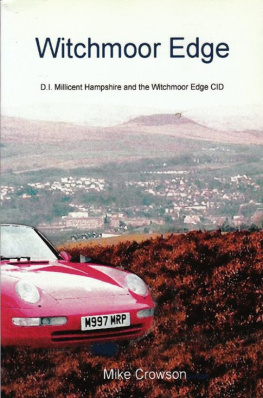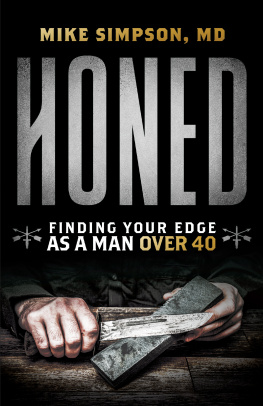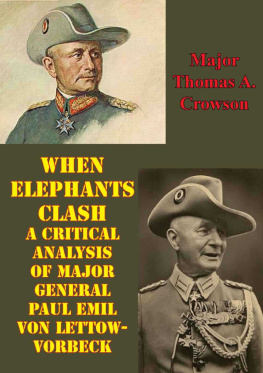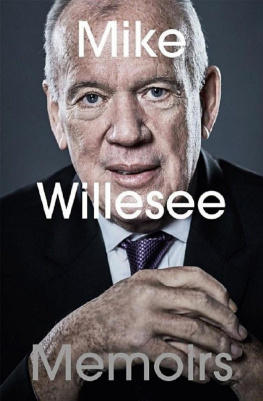Mike Crowson - Witchmoor Edge
Here you can read online Mike Crowson - Witchmoor Edge full text of the book (entire story) in english for free. Download pdf and epub, get meaning, cover and reviews about this ebook. year: 2010, publisher: Smashwords, genre: Detective and thriller. Description of the work, (preface) as well as reviews are available. Best literature library LitArk.com created for fans of good reading and offers a wide selection of genres:
Romance novel
Science fiction
Adventure
Detective
Science
History
Home and family
Prose
Art
Politics
Computer
Non-fiction
Religion
Business
Children
Humor
Choose a favorite category and find really read worthwhile books. Enjoy immersion in the world of imagination, feel the emotions of the characters or learn something new for yourself, make an fascinating discovery.
- Book:Witchmoor Edge
- Author:
- Publisher:Smashwords
- Genre:
- Year:2010
- Rating:3 / 5
- Favourites:Add to favourites
- Your mark:
- 60
- 1
- 2
- 3
- 4
- 5
Witchmoor Edge: summary, description and annotation
We offer to read an annotation, description, summary or preface (depends on what the author of the book "Witchmoor Edge" wrote himself). If you haven't found the necessary information about the book — write in the comments, we will try to find it.
Witchmoor Edge — read online for free the complete book (whole text) full work
Below is the text of the book, divided by pages. System saving the place of the last page read, allows you to conveniently read the book "Witchmoor Edge" online for free, without having to search again every time where you left off. Put a bookmark, and you can go to the page where you finished reading at any time.
Font size:
Interval:
Bookmark:
Witchmoor Edge

Mike Crowson
Millicent Hampshire and theWitchmoor Edge CID
Copyright 2000 Mike Crowson
Smashwords Edition 2010
Witchmoor Edge
Chapter 1: Sunday 12th August
A narrow boat doesn't go very fast, but it doesn'thave brakes. The Lucky Lady eased round the bend in the Leeds andLiverpool Canal, where Witchmoor merges indecisively with theShipley area of Bradford, and Joe Davis at once pushed the gearshift into reverse.
If you have any ideas of the Lucky Ladyscreeching to a halt, like an old time steam train, engineer in apanic at some obstacle on the line - forget it. The boat simplyslowed from a quick walk to a slow walk, to an amble, and the craftdrifted slowly towards the scene attracting Joe's attention.
Ahead firemen on the left bank were directingtwo jets of water across the canal at the burnt out shell of whatappeared to have been a warehouse on the right bank. There weresigns of activity on the other side too, behind the building. A jetof water could be seen arching through the morning sunlight,creating a little rainbow over the smoldering ruin. You couldn'tsee the source of the stream of water though.
More water was running from the smokingbuilding, onto a small stone quay and thence into the canal. Closeto the left bank, a ladder appeared to have fallen into the waterand a fireman was vainly attempting to retrieve it. Joe shifted theengine into neutral and let the Lucky Lady drift idly towards thetowpath at that point, and bump to a halt a few feet away.
He strolled to the bows and propelled theboat along by pushing on the bank with his hands until it waswithin an arm's length of the ladder, before he tied it to anunevenness in the towpath. Joe noticed that only one end of theladder was floating and wondered why both ends hadn't either sunkor floated.
"Morning," he said.
"I dropped the ladder and it fell in thewater," the fireman said unnecessarily. "Now it's just out ofreach."
"Watch you don't drop your helmet in aswell," Joe remarked , and leaned over the side to catch hold of thefloating end of the ladder.
"Here," he said, passing the end of theladder up to the man on the bank.
"Thanks," the fireman said and pulled. "Seemsto be stuck," he added a moment later.
Joe reached down from the 'Lucky Lady' andpulled as well, grasping the ladder nearer the water. It did seemto be stuck.
"Together," Joe grunted. "One, two, three..." They pulled together and the ladder came up, pulling with it abody, arm and shoulder stuck through one of the rungs.
"Well," Joe said ruminatively, "that's whatwere stopping it. Think yon body has anything to do wi' t'fire?"
"Maybe," the fireman answered. "Be quite acoincidence if there was no connection at all. I'd better notifythe police. They might want to look for any more bodies if they'vegot the divers to spare."
"Nice day for a dive," Joe remarked andstarted to light up his pipe.
Joe was not old. He was barely 50, but he hadthe mannerisms of an older man, phlegmatic and unhurried. He hadseen drowned men before and helped two of the firemen to get thebody onto the towpath. The dead man was in his early 40s, of mediumheight, dressed in a formal shirt and tie and dark trousers. Helooked like a casually but elegantly dressed professional man ofsome sort. He had a visible head wound where he had been hit withsomething hard and heavy. Joe didn't think he'd got that bangfalling into the water, but he didn't comment on it.
When the man was laid out on the towpath andthe police called, the fire brigade turned off one of the hoses andbegan packing their equipment away.
"When did it start?" Joe asked, standing afew feet from the bows of his narrow boat and leaning against thebank. He nodded towards the burned out shell.
"Someone called us about half past midnightthis morning," the fireman said. "It was well alight by then. Thefire must have started on the other side of the building, becauseit was all but gone when we got here. Woman over this side calledus."
"I thought it was all empty and boarded up,"Joe remarked. "It was due for demolition any time."
"Then it might have been workmen leftsomething behind," the fireman suggested. "Anyway, the police mightwant to look into it and see if the body's connected."
The siren of a police car could be heardapproaching. "Sounds like they're here now," Joe said, and took hispipe from his mouth to examine it. It had gone out, so he took alighter from his pocket to relight it.
* * *
Detective Inspector Millicent Hampshire proppedherself up on a pillow and took stock. Sun was streaming throughthe curtains and the room had a pleasant, rather dappled feel toit. Millicent was feeling this patchwork of colour appropriate to ameandering and rather aimless patchwork of thoughts and memories.Her mother had been from Belfast while her father had been - stillwas in fact - Afro-Caribbean. She was approaching forty and adetective with one hell of a reputation and a driving, ratherobsessive need to succeed. She was quite tall for a woman at over5'10", which is a respectable for a man, and looked a little prim.She was easy on the make up and straightened rather curly hair tomake it no more than wavy and she did not tint out the odd greystrand. However, she did visit the gym regularly and she was bothtrim and fit.
The prim image was misleading. For a start,Millicent was much more approachable than she seemed and, apartfrom a fiery temper when roused, easy to get on with. She waspopular with colleagues and subordinates and a good leader, whodrove herself harder than she did others.
What Millicent was considering now wasanother reason why one would not call her prim, and perhapscontributed to why she was such a good detective. Ever since shecould remember there had been insights or visions, in which puzzlesand problems became transparent and she was almost always able tospot a lie.
It was not something to talk about too much, and overthe years Carlos was the only person she had discussed her psychicinsights with, but her late Spanish policeman husband had beenblown up in an ETA car bomb incident years ago. Her daughter Anahad been brought up by Carlos's parents in Seville. Millicentregretted too late that she had not shared her daughter'schildhood, and let the years wash past her. She sighed.
The phone rang. Even in August at a weekend adetective was liable to be called from her headquarters, and no oneelse was likely to be calling her.
"Blast," she muttered and picked it up."Hampshire," she said.
"D.S. Gibbs here. Sorry to bother you offduty, but I wanted to check an idea I had with you before I okayedit."
Millicent knew that he didn't really likedeferring to a black woman who'd been fast tracked up the force. Heregarded her a bit as a token woman and felt that he had deservedthe promotion. Or rather, he had felt like that, but MillicentHampshire had the army background to give her a thick skin and shewas a good cop, for which he could take a lot. She preferred todelegate where she could and at least what he was calling about nowdidn't sound like something that needed her to go into work thismorning.
"Yes?" she queried.
Gibbs told her of the fire and the body. "I'dlike to get a couple of divers down there to take a quick look foranything else. What gave him that blow to the head and so on. If wewait till the post mortem report it might have gone cold."
"Nice day for a dive," Millicent observed."Go ahead if there's anyone available right now."
When Gibbs had rung off, she stirred herselfand climbed out of bed, crossing the carpeted floor of the cottageto the bathroom. It was one of those well modernised eighteenthcentury houses that are so prized by estate agents and theircustomers: stone built and mellow, just small enough to merit thedescription 'cottage' and the images that go with it, but largeenough to be practical when modernised. The corner of Baildon itoccupied was quiet on a Sunday morning.
Next pageFont size:
Interval:
Bookmark:
Similar books «Witchmoor Edge»
Look at similar books to Witchmoor Edge. We have selected literature similar in name and meaning in the hope of providing readers with more options to find new, interesting, not yet read works.
Discussion, reviews of the book Witchmoor Edge and just readers' own opinions. Leave your comments, write what you think about the work, its meaning or the main characters. Specify what exactly you liked and what you didn't like, and why you think so.










